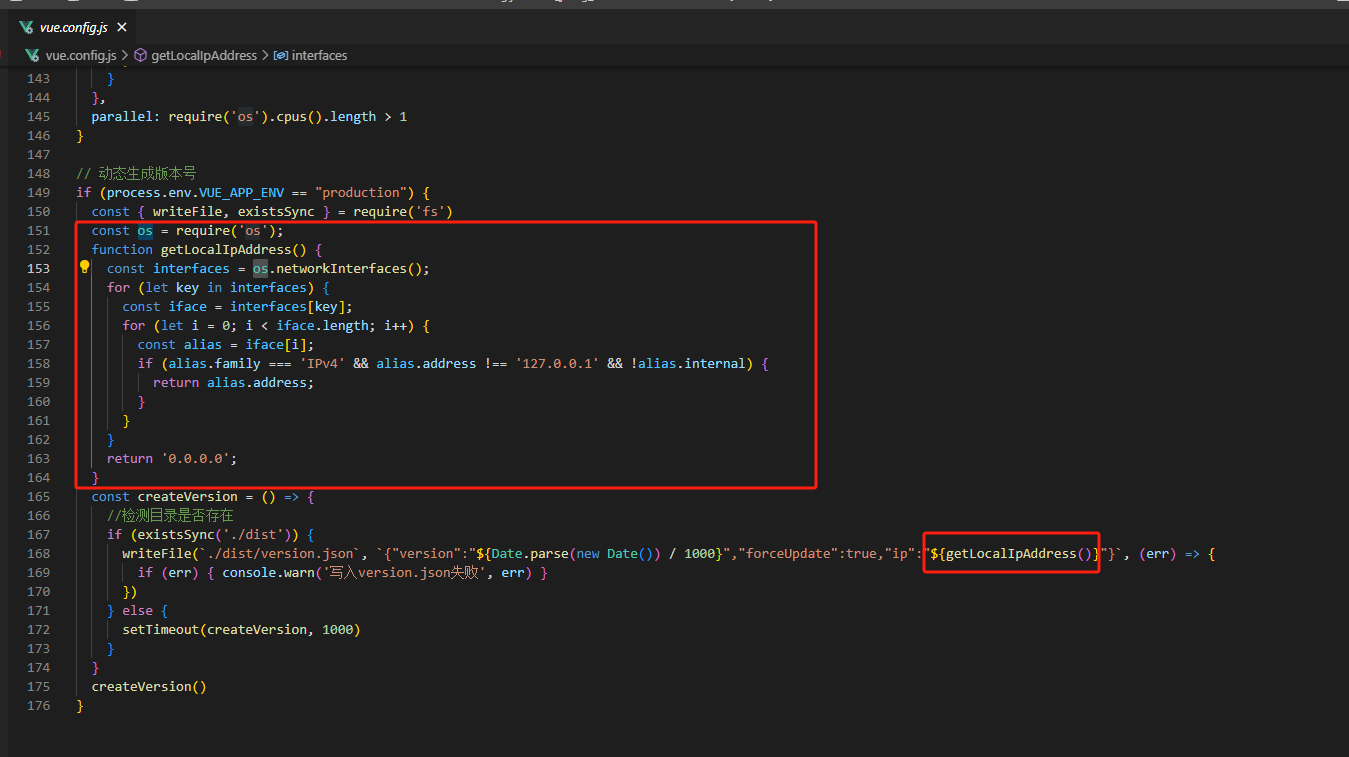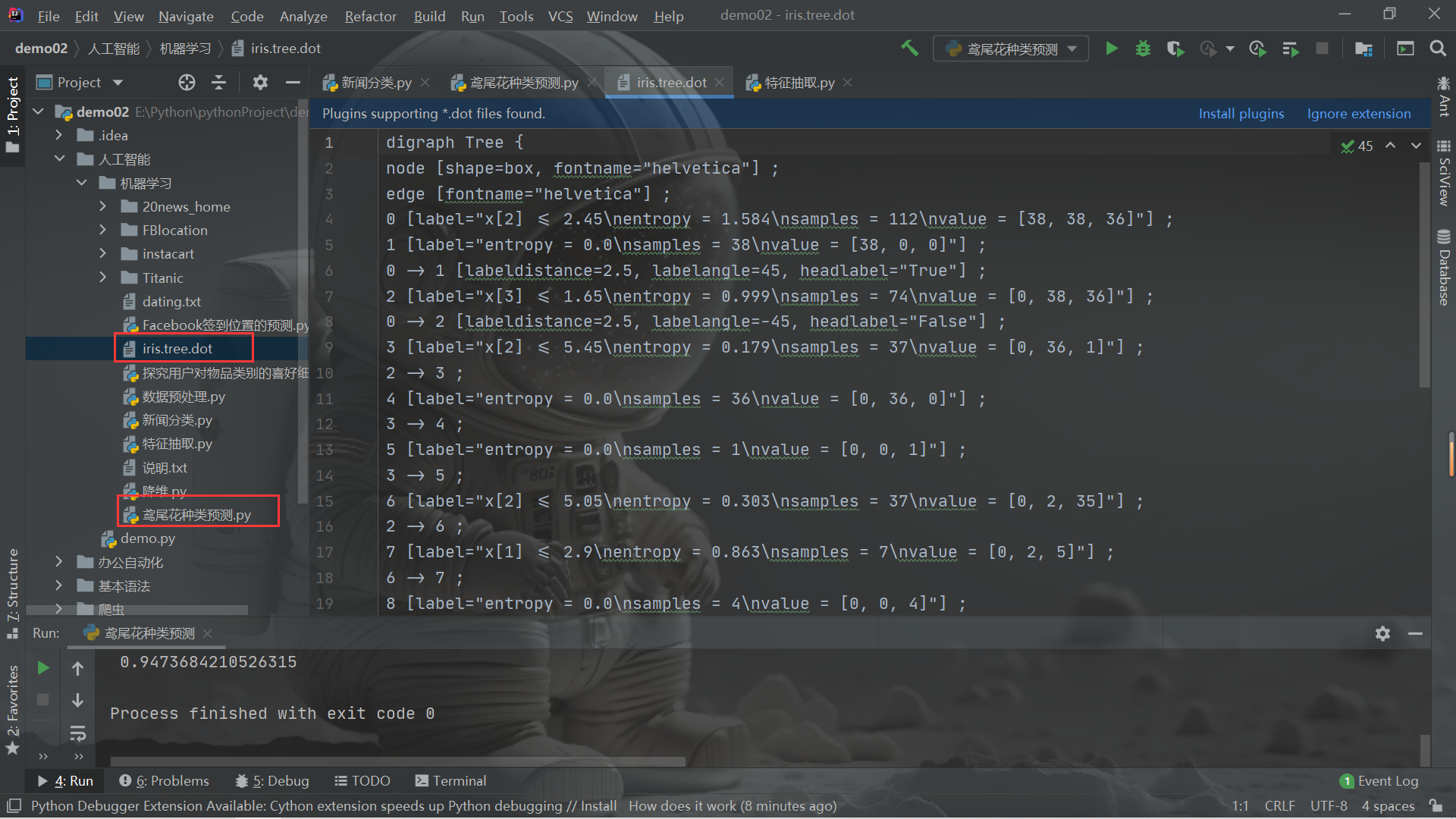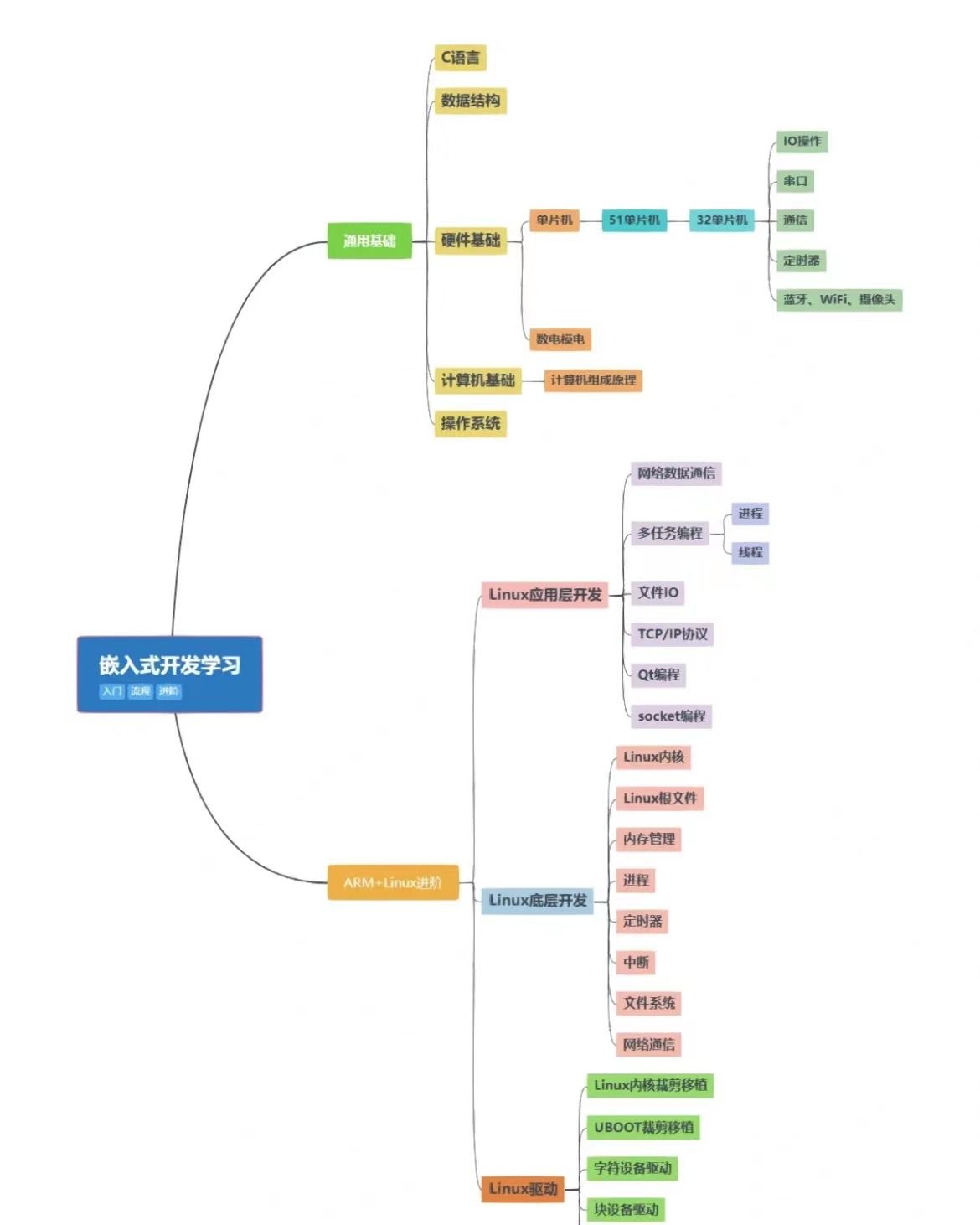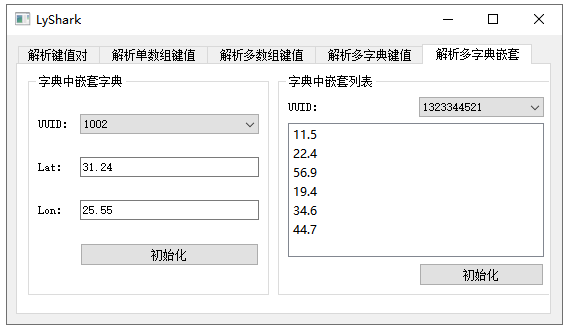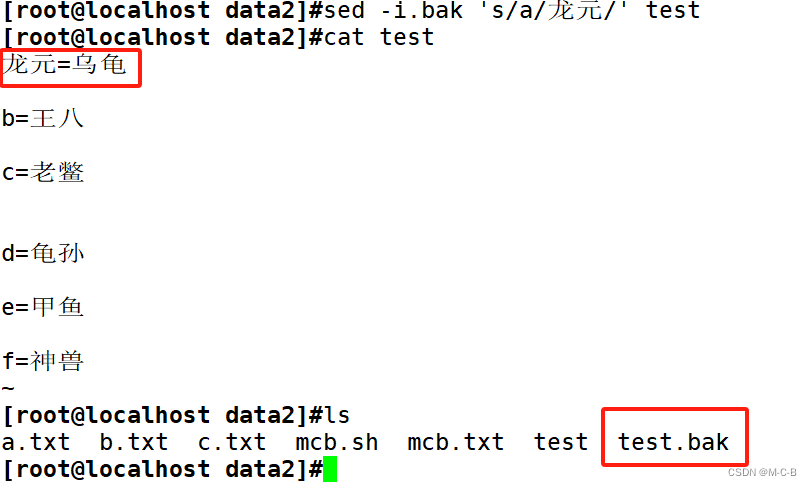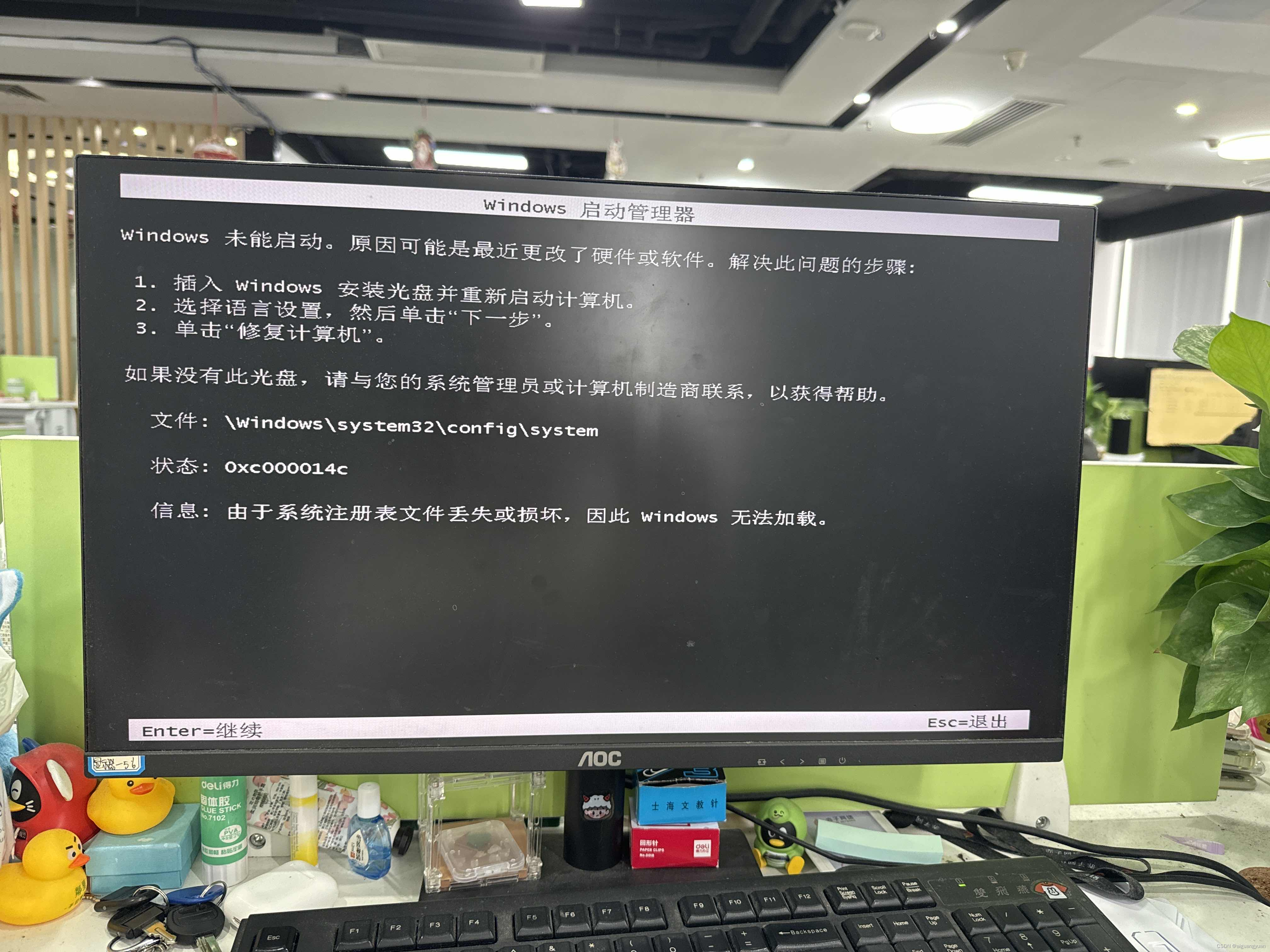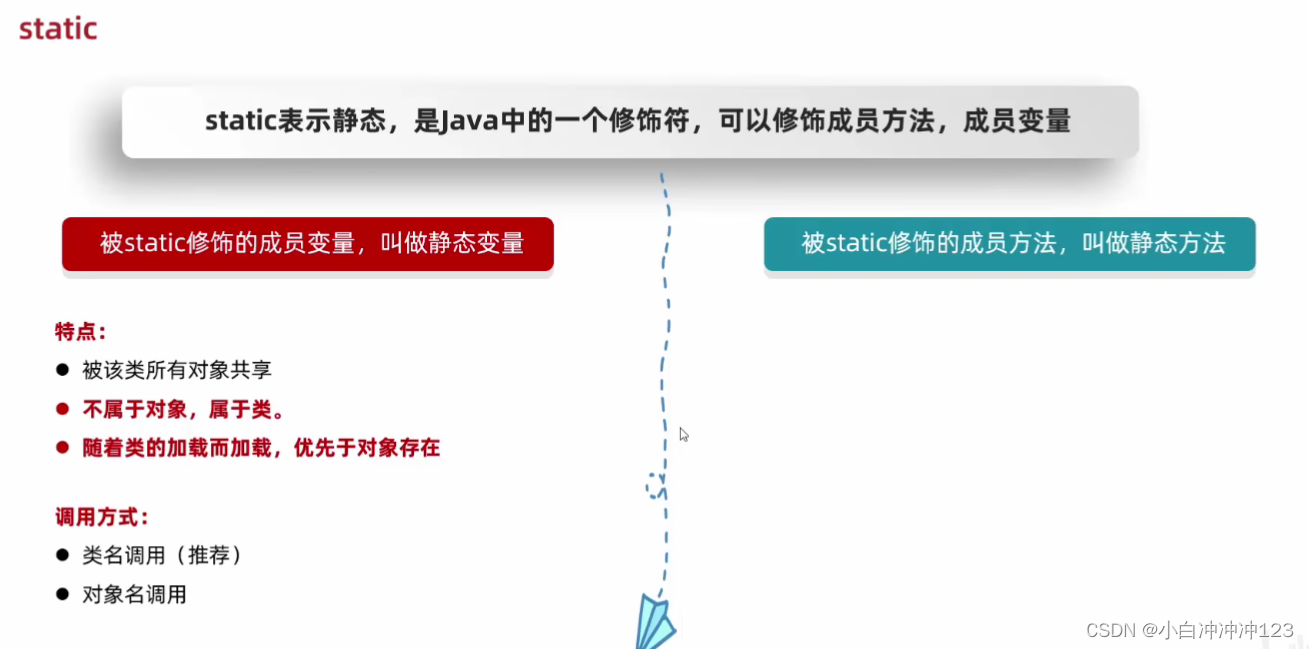系列文章目录
目录
系列文章目录
文章目录
前言
一、动态路由EIGRP是什么?
二、实验
1.引入
实验步骤
实验拓扑图
实验配置
看到D开头是便是我们的EIGRP动态路由
总结
文章目录
- 【学网攻】 第(1)节 -- 认识网络
- 【学网攻】 第(2)节 -- 交换机认识及使用
- 【学网攻】 第(3)节 -- 交换机配置聚合端口
- 【学网攻】 第(4)节 -- 交换机划分Vlan
- 【学网攻】 第(5)节 -- Cisco VTP的使用
- 【学网攻】 第(6)节 -- 三层交换机实现VLAN间路由
- 【学网攻】 第(7)节 -- 生成树配置
- 【学网攻】 第(8)节 -- 端口安全
- 【学网攻】 第(9)节 -- 路由器使用以及原理
- 【学网攻】 第(10)节 -- 路由器单臂路由配置
- 【学网攻】 第(11)节 -- 静态路由及默认路由
- 【学网攻】 第(12)节 -- 动态路由(RIP)
- 【学网攻】 第(13)节 -- 动态路由(OSPF)
前言
网络已经成为了我们生活中不可或缺的一部分,它连接了世界各地的人们,让信息和资源得以自由流动。随着互联网的发展,我们可以通过网络学习、工作、娱乐,甚至是社交。因此,学习网络知识和技能已经成为了每个人都需要掌握的重要能力。
本课程博主将带领读者深入了解网络的基本原理、结构和运作方式,帮助读者建立起对网络的全面理解。我们将介绍网络的发展历程、网络的分类和组成、网络的安全和隐私保护等内容,帮助读者掌握网络知识,提高网络素养。
通过学习本篇博客,读者将能够更好地利用网络资源,提高工作效率,拓展人际关系,甚至是保护自己的网络安全。网络世界充满了无限的可能,希望本课程能够帮助读者更好地驾驭网络,享受网络带来的便利和乐趣。
一、动态路由EIGRP是什么?
1.快速收敛:EIGRP使用DiffusingUpdate算法(DUAL)来实现快速收敛.路由器使用EIGRP来存储所有到达目的地的备份路由,以便进行快速切换.如果没有合适的或备份路由在本地路由表中的话.路由器向它的邻居进行查询来选择一条备份路由
2.减少带宽占用:EIGRP不作周期性的更新,它只在路由的路径和度发生变化以后做部分更新.当路径信息改变以后,DUAL只发送那条路由信息改变了的更新,而不是发送整个路由表.和更新传输到一个区域内的所有路由器上的链路状态路由协议相比,DUAL只发送更新给需要该更新信息的路由器
3.支持多种网络层协议:EIGRP通过使用protocol-dependentmodules(PDMs),可以支持ApplleTalk,IP和NovellNetware等协议,还支持IPv6
4.无缝连接数据链路层协议和拓扑结构:EIGRP不要求对OSI参考模型的层2协议做特别是配置.不像OSPF,OSPF对不同的层2协议要做不同配置,比如以太网和帧中继总之,EIGRP能够有效的工作在LAN和WAN中,而且EIGRP保证网络不会产生环路(loop-free);而且配置起来很简单;支持VLSM;它使用多播和单播,不使用广播,这样做节约了带宽;它使用和IGRP一样的度的算法,但是是32位长的;它可以做非等价的路径的负载平衡
二、实验
1.引入
实验目的
- 掌握EIGRP协议的配置方法:
- 掌握查看通过动态路由协议EIGRP学习产生的路由;
- 熟悉广域网线缆的链接方式;
实验背景
假设校园网通过一台三层交换机连到校园网出口路由器上,路由器再和校园外的另一台路由器连接。现要做适当配置,实现校园网内部主机与校园网外部主机之间的相互通信。为了简化网管的管理维护工作,学校决定采用EIGRP协议实现互通。
技术原理
EIGRP 用于 TCP/IP 和开放式系统互联 (OSI) 互联网。原始 IP 版本于 1986 年设计并成功部署。它被当作IGP但也被广泛地当作外部 网关 协议(EGP),用于领域间路由。IGRP 采用距离矢量路由技术。其概念便是每台路由器都不需要知道整个网络的所有路由器/链路的关系。每个路由器以相应的距离通告目标。每个收到信息的路由器会对距离进行调整,并将其传播至相邻路由器。
EIGRP的距离信息表示为可用带宽、延迟、负载利用率和链路可靠性的组合。这样可以调整链路特性,以实现最佳路径。
实验步骤
- 新建packet tracer拓扑图
- 在本实验中的三层交换机上采用三层接口,
- 路由器之间通过V35电缆通过串口连接,DCE端连接在R1上,配置其时钟频率64000。
- 主机和交换机通过直连线,主机与路由器通过交叉线连接。
- 在S3560上配置EIGRP路由协议。
- 在路由器R1、R2上配置路由协议。
- 将PC1、PC2主机默认网关设置为与直连网路设备接口IP地址。
- 验证PC1、PC2主机之间可以互相同信;
实验设备
PC 2台;Switch_3560 1台;Router-PT 2台;直连线;交叉线;DCE串口线
实验拓扑图
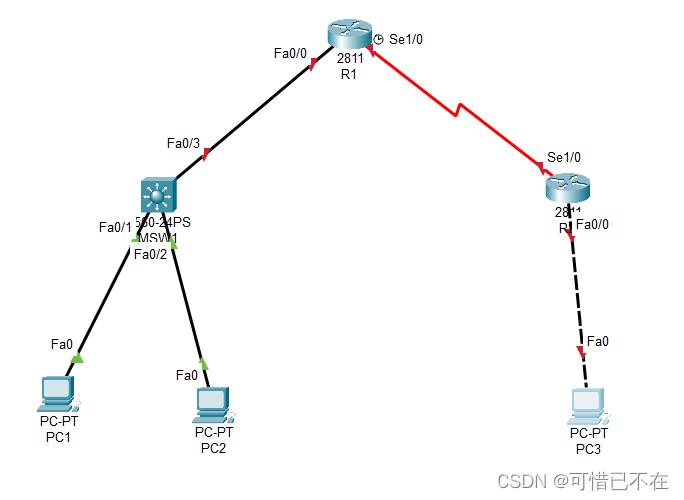
实验配置
PC
PC1: IP 地址:192.168.1.1 子网掩码:255.255.255.0 网 关:192.168.1.254 PC2: IP 地址:192.168.2.1 子网掩码:255.255.255.0 网 关:192.168.2.254 PC3: IP 地址:192.168.3.1 子网掩码:255.255.255.0 网 关:192.168.3.254
MSW1;R1;R2基础配置
MSW1: Switch>en Switch#conf t Enter configuration commands, one per line. End with CNTL/Z. Switch(config)#h MSW1 MSW1(config)#int f0/1 MSW1(config-if)#no sw MSW1(config-if)#ip add 192.168.1.254 255.255.255.0 MSW1(config-if)#int f0/2 MSW1(config-if)#no sw MSW1(config-if)#ip add 192.168.2.254 255.255.255.0 MSW1(config-if)#int f0/3 MSW1(config-if)#no sw MSW1(config-if)#ip add 10.0.1.1 255.255.255.0 R1: Router> Router>en Router#conf t Enter configuration commands, one per line. End with CNTL/Z. Router(config)#h R1 R1(config)#int f0/0 R1(config-if)#ip add 10.0.1.2 255.255.255.0 R1(config-if)#no shut R1(config-if)#int s1/0 R1(config-if)#ip add 10.0.2.1 255.255.255.0 R1(config-if)#clock r 64000 R1(config-if)#no shut R2: Router>en Router#conf t Enter configuration commands, one per line. End with CNTL/Z. Router(config)#h R2 R2(config)#int s1/0 R2(config-if)#ip add 10.0.2.2 255.255.255.0 R2(config-if)#no shut R2(config-if)#int f0/0 R2(config-if)#ip add 192.168.3.254 255.255.255.0 R2(config-if)#no shutdown
EIGRP配置
MSW1: MSW1(config)#ip routing MSW1(config)#router eigrp 100 MSW1(config-router)#no auto-summary //关闭自动汇总 MSW1(config-router)#net 192.168.1.0 0.0.0.255 MSW1(config-router)#net 192.168.2.0 0.0.0.255 MSW1(config-router)#net 10.0.1.0 0.0.0.255 R1: R1(config)#ip routing R1(config)#router eigrp 100 R1(config-router)#no auto-summary //关闭自动汇总 R1(config-router)#network 10.0.1.0 0.0.0.255 R1(config-router)#network 10.0.2.0 0.0.0.255 R2: R2(config)#ip routing R2(config)#router eigrp 100 R2(config-router)#no auto-summary R2(config-router)#net 10.0.2.0 0.0.0.255 R2(config-router)#net 192.168.3.0 0.0.0.255
Show MSW1;R1;R2路由
MSW1: MSW1(config)#do show ip route Codes: C - connected, S - static, I - IGRP, R - RIP, M - mobile, B - BGP D - EIGRP, EX - EIGRP external, O - OSPF, IA - OSPF inter area N1 - OSPF NSSA external type 1, N2 - OSPF NSSA external type 2 E1 - OSPF external type 1, E2 - OSPF external type 2, E - EGP i - IS-IS, L1 - IS-IS level-1, L2 - IS-IS level-2, ia - IS-IS inter area * - candidate default, U - per-user static route, o - ODR P - periodic downloaded static route Gateway of last resort is not set 10.0.0.0/8 is variably subnetted, 3 subnets, 2 masks D 10.0.0.0/8 is a summary, 00:06:35, Null0 C 10.0.1.0/24 is directly connected, FastEthernet0/3 D 10.0.2.0/24 [90/20514560] via 10.0.1.2, 00:05:26, FastEthernet0/3 C 192.168.1.0/24 is directly connected, FastEthernet0/1 C 192.168.2.0/24 is directly connected, FastEthernet0/2 D 192.168.3.0/24 [90/20517120] via 10.0.1.2, 00:03:23, FastEthernet0/3 R1: R1(config)#do show ip route Codes: L - local, C - connected, S - static, R - RIP, M - mobile, B - BGP D - EIGRP, EX - EIGRP external, O - OSPF, IA - OSPF inter area N1 - OSPF NSSA external type 1, N2 - OSPF NSSA external type 2 E1 - OSPF external type 1, E2 - OSPF external type 2, E - EGP i - IS-IS, L1 - IS-IS level-1, L2 - IS-IS level-2, ia - IS-IS inter area * - candidate default, U - per-user static route, o - ODR P - periodic downloaded static route Gateway of last resort is not set 10.0.0.0/8 is variably subnetted, 4 subnets, 2 masks C 10.0.1.0/24 is directly connected, FastEthernet0/0 L 10.0.1.2/32 is directly connected, FastEthernet0/0 C 10.0.2.0/24 is directly connected, Serial1/0 L 10.0.2.1/32 is directly connected, Serial1/0 D 192.168.1.0/24 [90/30720] via 10.0.1.1, 00:06:18, FastEthernet0/0 D 192.168.2.0/24 [90/30720] via 10.0.1.1, 00:06:18, FastEthernet0/0 D 192.168.3.0/24 [90/20514560] via 10.0.2.2, 00:04:04, Serial1/0 R2: R2(config)#do show ip route Codes: L - local, C - connected, S - static, R - RIP, M - mobile, B - BGP D - EIGRP, EX - EIGRP external, O - OSPF, IA - OSPF inter area N1 - OSPF NSSA external type 1, N2 - OSPF NSSA external type 2 E1 - OSPF external type 1, E2 - OSPF external type 2, E - EGP i - IS-IS, L1 - IS-IS level-1, L2 - IS-IS level-2, ia - IS-IS inter area * - candidate default, U - per-user static route, o - ODR P - periodic downloaded static route Gateway of last resort is not set 10.0.0.0/8 is variably subnetted, 3 subnets, 2 masks D 10.0.1.0/24 [90/20514560] via 10.0.2.1, 00:04:28, Serial1/0 C 10.0.2.0/24 is directly connected, Serial1/0 L 10.0.2.2/32 is directly connected, Serial1/0 D 192.168.1.0/24 [90/20517120] via 10.0.2.1, 00:04:28, Serial1/0 D 192.168.2.0/24 [90/20517120] via 10.0.2.1, 00:04:28, Serial1/0 192.168.3.0/24 is variably subnetted, 2 subnets, 2 masks C 192.168.3.0/24 is directly connected, FastEthernet0/0 L 192.168.3.254/32 is directly connected, FastEthernet0/0
看到D开头是便是我们的EIGRP动态路由
实验验证
PC1 Ping PC2
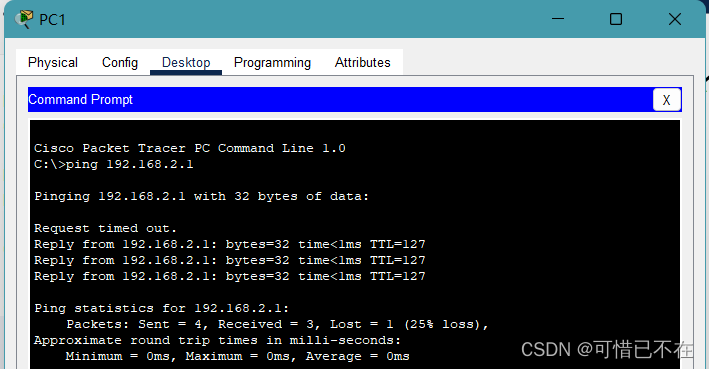
PC1 Ping PC3

PC2 Ping PC3
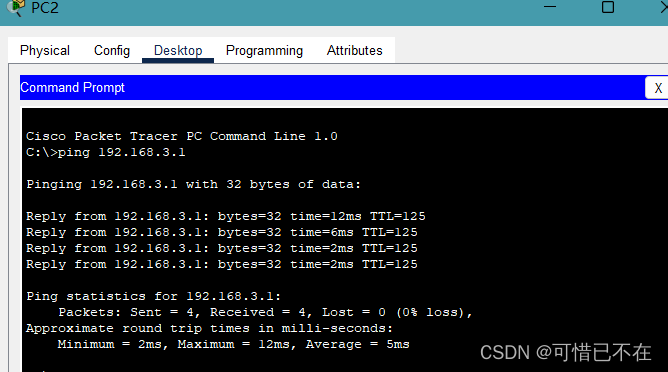
| PC1 Ping PC2 | 通 |
| PC1 Ping PC3 | 通 |
| PC2 Ping PC3 | 通 |
总结
域内路由协议(Interior Gateway Protocol,IGP)我们讲完了
RIP,OSPF,EIGRP
之后可能会讲域间路由协议(Exterior Gateway Protocol,EGP)
EGP和BGP

